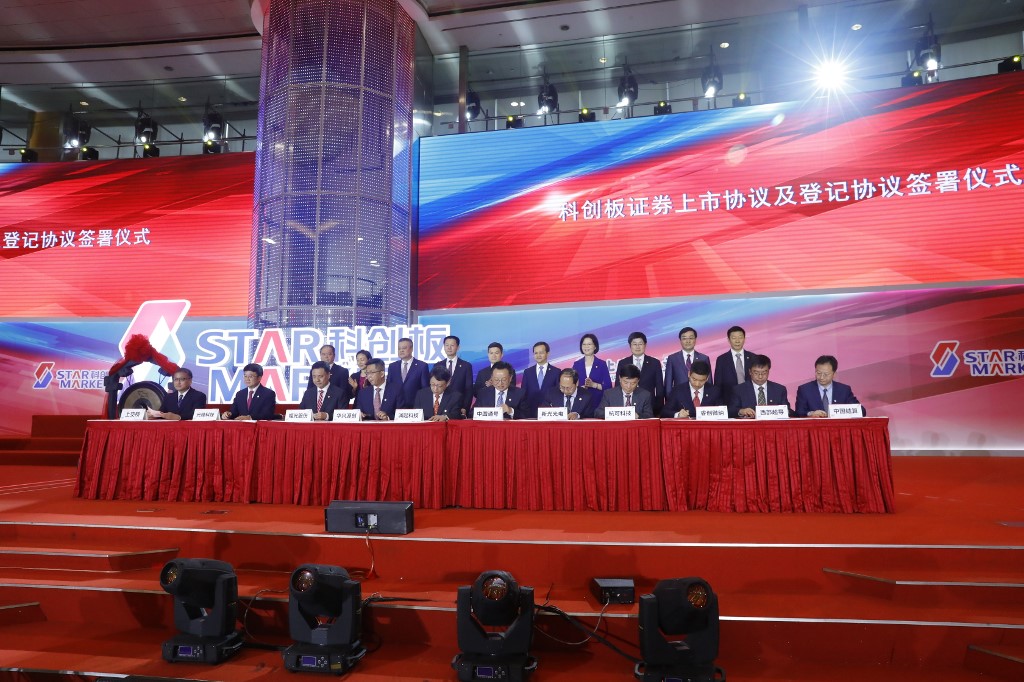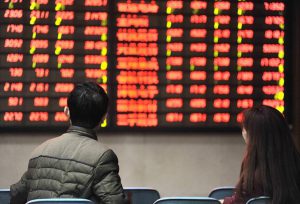(ATF) The first four exchange traded funds (ETFs) to track Shanghai Stock Exchange’s Nasdaq-style STAR Market started trading on Monday November 16. They can be bought and sold similarly as company stocks and provide investors access to the STAR Market’s top 50 companies.
The ETFs are managed by China Asset Management, E Fund Management, Huatai-PineBridge Fund Management, and ICBC Credit Suisse Asset Management. Initial fundraising of the ETFs started in September and they received nearly 100 billion yuan (US$15.2 billion) in subscriptions.
The four ETFs are the first to track the the Shanghai Stock Exchange Science and Technology Innovation Board 50 Index (the “SSE STAR 50 Index”), which was launched jointly by the Shanghai bourse and China Securities Index about a year ago following the board’s trading debut last July.
The Asia Eight: Daily must-reads from world’s most dynamic region
There are now 195 companies with a combined market cap of 3.09 trillion yuan ($470 billion) listed on the STAR board, according to data released by the Shanghai exchange.
An easier way to access STAR
The STAR 50 Index consists of the 50 largest stocks listed on the Star Market that have also passed certain liquidity requirements. Constituents are weighted by float-adjusted market capitalisation.
“Constituents of the STAR 50 index are leading companies in the tech sector with high growth potential. The STAR 50 combines a broad-based index and a tech sector index in one… It lowers the risks and entry barriers for retail investors to access the STAR market,” Zhang Xinwei, an analyst from Guoxin Securities, said in a commentary.
Constituents of the STAR 50 Index include Beijing Kingsoft Office Software, Shenzhen Transsion Holdings, Advanced Micro-Fabrication Equipment, and Shanghai Friends Electronic Technology.
Because of the high volatility of the STAR Market, Shanghai Stock Exchange has required that only “savvy” investors with at least two years of stock trading experience and a minimum of 500,000 yuan ($76,050) of assets in their stock brokerage account can invest in the STAR Market.
The entry barrier is much lower for the STAR 50 Index ETF. Anybody with a brokerage account can invest in it, and buying the minimum 100 units of a STAR 50 Index ETF only costs about 150 yuan ($22.80).
High volatility
From a base of 1,000 points at the end of 2019, the Star 50 Index has surged over 40% so far this year, dwarfing the 22% growth logged by the CSI 300 Index, which tracks the performance of the top 300 stocks traded in Shanghai and Shenzhen, according to Wind info.
The volatility of the STAR Market is also higher. The stocks on STAR can move 20% daily while those on the main board have a daily cap of 10%.
Song Yang, an analyst from Bohai Securities, suggests that investors purchase the STAR 50 Index ETF in several batches or periodically to avoid the risks associated with high volatility.
Overall, he thinks the STAR 50 Index ETF is a useful investment vehicle for investors who wish to diversity their portfolio, spread risks and get a share of the high yield of the STAR Market.
“Still in early stage”
However, some retail investors do not find the STAR 50 Index ETF to be attractive.
Eric Hu, a Shanghai-based product manager who has over 10 years of stock investment experience, told ATF he would not buy the STAR 50 Index ETF.
“It is still in an early stage. The really good tech companies such as Alibaba, JD.com and Pingduoduo, are not in the STAR 50 Index. I would rather invest in Chinese tech companies listed on the Hong Kong Stock Exchange. Many US-listed Chinese tech companies are coming back to list in Hong Kong now,” he said.
Because of the increasing US-China tension, many US-listed Chinese companies have chosen a secondary listing in Hong Kong since last November. Among them are Alibaba Group, JD.com, and NetEase.
Some companies have chosen to list in Shanghai.
China’s largest chip maker, Semiconductor Manufacturing International Corp (SMIC), ended its 15-year US listing last year, and debuted on the STAR Market this July.
The Alibaba affiliate Ant Group had planned to raise $35 billion via a dual listing on Shanghai’s STAR Market and Hong Kong Stock Exchange. But the world’s largest IPO was derailed by Chinese regulators earlier this month just 36 hours before its trading debut.
Analysts previously expected Ant Group to be included in the STAR 50 Index in March of next year.
























